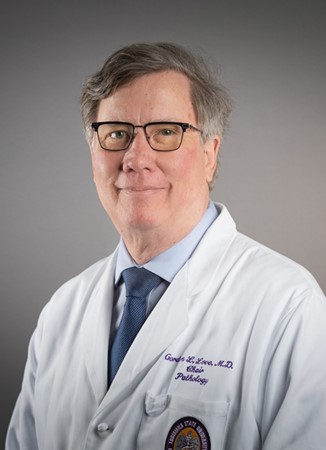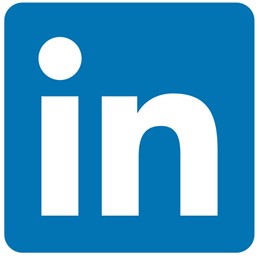A Message from the Chairman
Pathology is the study of human disease. At Louisiana State University School of Medicine in New Orleans (LSUHSC-NO), in conjunction with the fully accredited laboratory at University Medical Center-New Orleans (UMC-NO), we are applying and researching new and exciting diagnostic techniques to improve patient care.
UMC-NO is the region’s newest hospital, having opened in 2015 with 400-plus beds. The clinical laboratory is fully accredited by the College of American Pathologists and boasts extensive automated lines for robotic handling and analysis of medical specimens. Our team of board-certified pathologists have specialty board certification or specialty expertise by fellowship training in Genitourinary Pathology, Breast Pathology, Cytopathology, Hematopathology, Gynecologic Pathology, Molecular Pathology, and Medical Microbiology.
- LSUHSC-NO and UMC-NO feature an extensive list of on-site analytics with full anatomic
and clinical pathology services:
We interpret more than 8,000 surgical specimens per year and perform on-site special stains and immunocytochemistry tests. - Our American Association of Blood Banks (AABB) certified blood bank supports all facets
of UMC-NO, including support of its Level 1 Trauma Center and its Burn Unit.
- Our comprehensive microbiology laboratory at UMC-NO provides identification of aerobic
and anaerobic bacteria, acid-fast bacteria, fungi and parasites, and uses state-of-the-art
instrumentation including Maldi-tof for the identification of any infectious organism
that can be grown in pure culture. Extensive use is made of multiplex PCR panels for
evaluation of gastrointestinal, respiratory, and central nervous system infections.
Detection of sepsis is optimized through use of a closed blood culture system with
detection of pathogens by a blood culture multiplex polymerase chain reaction system.
Microbiology culture and specimens from multiple hospitals within the LCMC system
are referred to the UMC-NO microbiology laboratory for evaluation 24/7 by trained
microbiology medical technologists.
- The molecular laboratory determines hepatitis B, C, and HIV viral load levels and
genotyping.
- We are very excited about our Precision Medicine (Tumor Genomics) Laboratory at LSUHSC-NO, which is set to open in mid-2025. It will offer the FDA-approved TruSight Oncology 500, which enables comprehensive genomic profiling of solid tumors with a large pan-cancer panel covering all major variant classes and gene signatures. It targets 523 genes to assess all DNA and RNA variant types plus tumor mutational burden, microsatellite instability and homologous recombination deficiency from formalin-fixed, paraffin-embedded tissue. The evaluation of more than 500 pan-cancer biomarkers aligned with guidelines and clinical trials increases the chances of finding a positive biomarker with a single assay. This laboratory is a joint operation between the Departments of Pathology and Genetics and features the Illumina NextSeq 550 DX polymerase chain reaction analyzer that can produce up to 384 results in just 12 hours. LSUHSC-NO’s Precision Medicine Laboratory will be the only laboratory in south Louisiana to perform this analysis, with the goal of stopping or slowing progress of malignant tumors by identifying which drugs or treatments will be most beneficial to survival.
Our residency program is and has been fully accredited in both anatomic and clinical pathology (APCP) for more than 60 years and is approved for 12 residents. Our goal is to provide our residents with practical, hands-on exposure to both anatomic and clinical pathology so they will become confident and experienced to begin specialized fellowships or enter Pathology practice at the end of their four-year residency. Our physicians also instruct 700+ LSU Medical School-NO students in all areas of pathology to understand the mechanisms of disease that are the basis for clinical practice.
We are proud of our timely response to SARS-CoV-2. The Department of Pathology acted rapidly to support the development of multiple testing platforms. We decided early to begin performing autopsies on COVID deaths, and our findings were among the first publications in the nation to describe the pathology of COVID disease. We continue to study SARS-CoV-2 and publish our findings in conjunction with other researchers. Click here to see a listing of COVID-19 articles, interviews and publications by the department.
Gordon L. Love, M.D.
Chairman, Department of Pathology, LSU School of Medicine
Jack Perry Strong Endowed Chair of Pathology
Professor of Clinical Pathology
Medical Director of the Clinical Laboratories,
University Medical Center – New Orleans
New Orleans East Hospital
Louisiana State University Health Sciences Center – New Orleans
Precision Medicine Laboratory

 University School of Medicine in New Orleans (LSUHSC-NO), in conjunction with the
fully accredited laboratory at University Medical Center-New Orleans (UMC-NO), we
are applying and researching new and exciting diagnostic techniques to improve patient
care.
University School of Medicine in New Orleans (LSUHSC-NO), in conjunction with the
fully accredited laboratory at University Medical Center-New Orleans (UMC-NO), we
are applying and researching new and exciting diagnostic techniques to improve patient
care.

